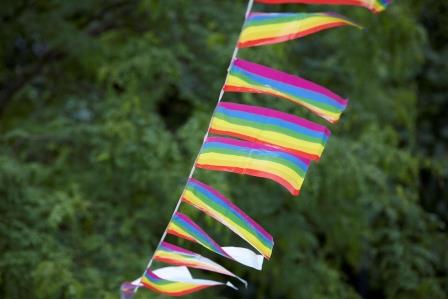How often have you heard someone talk about ‘the heterosexual community’? Rarely or never, I would guess, but the phrase ‘LGBT community’ is frequently used by policy-makers, service providers, and lesbian, gay, bisexual and trans (LGBT) people themselves, particularly during February, which is LGBT history month. So what understandings and experiences does that phrase conjure up – or ignore? I addressed this question in UK-wide research funded by the Arts and Humanities Research Council, involving over 600 participants. It is examined in detail in my new book Exploring LGBT spaces and communities. Here I offer three reasons why the term ‘LGBT community’ is problematic.
First, the acronym ‘LGBT’, which is most often used, excludes some who may wish to align themselves with LGBT people, such as those who identify as queer or intersex. Even those who do feature within these four letters, notably bisexual and trans people, can feel marginalised (including by lesbian and gay people). This has important implications for service delivery premised on the notion of ‘LGBT community’, because for some it is inherently exclusionary.
Second, the word ‘community’ can be understood in many different ways. In my research, people experienced it as space (e.g. the commercial scene or particular areas such as Brighton); as virtual (i.e. online); as temporary (e.g. at Pride events), and/or as imagined. All these perspectives are important because people often shared fears or negative expectations of wider society, meaning they wanted the idea of ‘LGBT community’. However, the term ‘community’ does not capture these differences and complexities, and can wrongly suggest or assume a shared experience.
Third, the phrase ‘LGBT community’ suggests that LGBT people should feel part of something, which if they don’t, can heighten negative experiences. Language use is important, and using ‘community’ tends to overlook differences and potential tensions between LGBT people. It also implies that LGBT people somehow automatically belong to a ready-made community. This is not the case! Many participants talked about trying, and failing, to ‘find’ such a thing. Others experienced discrimination from LGBT people relating to their age, body, disability, ethnicity, faith, HIV status, perceived social class, and so on.
It was clear that community belonging is not a given even when people share a gender or sexual identity. Use of the term ‘LGBT community’ could therefore be experienced as offensive, as it was thought to deny or render invisible experiences of inequality and prejudice among LGBT people. Often feelings of community belonging were thought to be conditional on the basis of conforming to particular norms and/or ‘fitting in’ in other ways. The notion of ‘LGBT community’ is therefore problematic because of a suggestion that it requires a similarity that was often felt to not exist, or be desirable.
This is not merely an ‘academic debate’. I was surprised at the strength of feeling some people had, and sympathise with their reasons. When policy-makers, service providers or educators use the term ‘LGBT community’ they are at risk of deterring some LGBT (and other) people from engaging. As one participant commented, “[I] find anyone who uses this language dubious and with doubtful intention”.
I’m not suggesting that we should abandon the phrase altogether, as my research did find evidence that people often wanted to feel safe, connected and/or a sense of belonging with other LGBT people, which the word ‘community’ might capture. However, I do think people should ask themselves ‘do I mean community?’. Often, using ‘LGBT people’ would be more accurate, and would not risk suggesting that LGBT people’s needs and experiences are all the same. Alternatively, using ‘LGBT communities’ in the plural does at least acknowledge difference and diversity amongst LGBT people. Yet I am surprised how little this gets used, even now.
An earlier version of this blog featured in The Conversation. Eleanor Formby is a Senior Research Fellow at Sheffield Hallam University. Her book is available here. She will be delivering an LGBT history month talk at Sheffield Hallam University on February 14th.

Leave a Reply